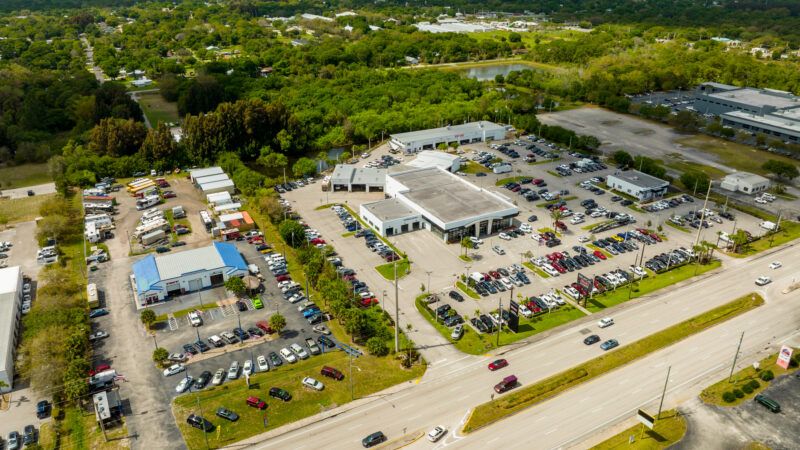Florida Doubles Down on Anti-Competitive Car Dealership Law
Automobile dealers say the law will preserve and protect the "competitive nature" of the business, by removing their competitors.

This week, Florida Gov. Ron DeSantis signed H.B. 637 into law. The bill, which goes into effect July 1, bans most vehicle manufacturers from selling their products directly to consumers. Instead, automakers must continue to rely on franchised dealerships to act as middlemen. Florida already banned most automakers from selling directly to consumers; H.B. 637 affirms the ban, with some carve-outs.
The new law is a bad deal for consumers, and it's a bad deal that exists across the country.
Virtually all states have some form of law keeping automakers from selling directly to consumers or operating their own dealerships. That's why even if you go online and pick out a car on the manufacturer's website, you typically can't get it delivered to your door the way you would with nearly any other product; you have to contract with a local dealership, owned by a third party, to facilitate the transaction.
The Florida law is a boon to dealers, who overwhelmingly favored it: The Florida Automobile Dealers Association (FADA), which was involved in drafting the legislation, released an issue brief in February supporting the bill. It cited up-and-coming electric vehicle (E.V.) manufacturers like Tesla and Rivian that threaten the franchise dealership model: Tesla owns all of its retail locations, while Rivian has none.
But notably, the bill would not ban direct-to-consumer sales entirely: Lobbyists working on behalf of Tesla negotiated a carve-out in the bill that would allow automakers currently selling that way to continue to do so, while legacy automakers would be forbidden.
"As new EV companies have entered the marketplace, some legacy manufacturers have begun to mirror their programs," the FADA brief cautioned. While noting that Florida dealers do not oppose newcomers that sell directly to consumers, "legislation should make it clear that a legacy manufacturer (a manufacturer that has an independent dealer network) may not own, directly or through a commercial entity, a dealership nor sell direct-to-consumer." (Other states have floated similar laws without carve-outs: In March, the Mississippi Senate approved a bill that would hold E.V. manufacturers to the same franchise dealer rules as other automakers. Tesla and Rivian would have to build brick-and-mortar dealerships just for the privilege of selling to Mississippians.)
FADA insisted the bill is necessary to "protect the competitive nature of the franchise system." It further claimed, "The franchise system has always driven prices down for the consumer," and dealers "offer every advantage of the direct sellers" while remaining local. FADA lobbyist Dave Ramba told Florida Politics, "The attempt by auto manufacturers to cut out the dealer would only result in higher prices and less customer service to the public."
This is nonsense. True competition would involve welcoming as many competitors as possible. Dealer protection laws don't make the car-buying process better for buyers—most people, especially younger buyers, don't enjoy having to go to a dealership and haggle over prices. And experts hate it, too: "The argument that adding a mandatory layer of costs between the manufacturer and the consumer will reduce consumer prices has no basis in economics," according to a 2020 letter signed by dozens of economists and law professors. "Nor do arguments that dealers are necessary to advocate for consumer interests in obtaining recalls or warranty service make any sense."
The Federal Trade Commission has also determined over the years that dealer franchise laws "harmed consumers because they caused motor vehicle prices to rise" and "insulate motor vehicle dealers from competition from automotive manufacturers."
As with any other product, the market should decide the best way to buy and sell a given product. Since the dealership model is increasingly outdated, dealers turn to state law in order to retain a competitive advantage.


Show Comments (64)